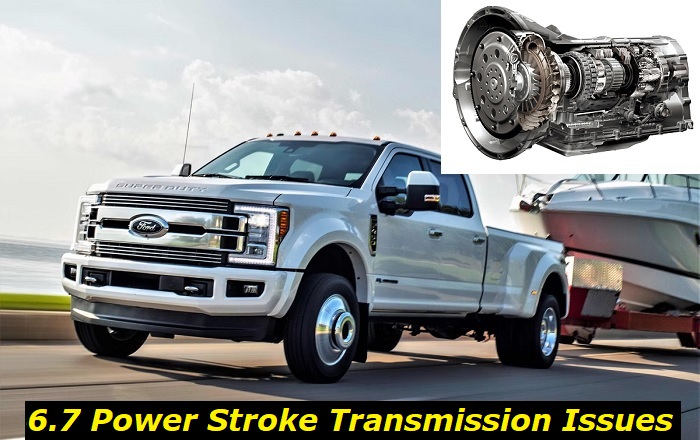The 6.7 Power Stroke is a diesel engine that was introduced in 2011. It is used in Ford Super Duty trucks and vans. The engine is generally commended due to its superb performance, decent fuel economy, and proven reliability.
6.7 Power Stroke automatic transmission highlights
- Average lifespan:210,000-240,000 miles
- Reliability Score:High
- Prone to minor issues:Sometimes
- Price for repair after failure:$1,200-$2,100
- Price for replacement:$5,500-$6,500
- Availability of parts:Average
- Common problems:overheating issues, problems in modified cars, issues with poor maintenance.

Most Common 6.7 Power Stroke Transmission Problems
The most common transmission problem with the 6.7 Power Stroke is shifting issues. This can manifest itself in a number of ways.
You may notice that your truck jerks when it shifts gears or that it takes longer than usual for the gear to engage. You may also feel that the truck seems to be searching for gears when you are driving at slower speeds. These are all signs that there may be an issue with the transmission.
Another common problem is that the transmission may slip out of gear. This can happen when you are driving at higher speeds and can be very dangerous in certain instances.
Such problems carry risks that may damage your engine or vehicle, or cause accidents along the way.
Risks Posed by a Bad Transmission in the 6.7 Power Stroke
The transmission is one of the most important parts of your car, and a bad transmission can cause a lot of problems. Here are some of the risks of having a bad transmission:
1. Your vehicle may not be able to move.
If your transmission is damaged, it may not be able to properly engage the engine, meaning your car won't be able to move. This can be extremely frustrating and can leave you stranded in an inconvenient or dangerous location.
2. Your vehicle may have reduced power.
A damaged transmission can also reduce the amount of power your engine produces. This can make it difficult to accelerate or climb hills and can make your car less fuel-efficient.
3. Your car may make strange noises.
If your transmission is damaged, it may start to make strange noises, like grinding or humming. This can be both annoying and concerning and is often an indication that the transmission needs to be repaired or replaced.
4. Your car may leak fluid.
If your transmission is damaged, it may start to leak fluid. This can be a serious problem, as transmission fluid is essential for the proper functioning of the transmission. If your car starts to leak transmission fluid, it's important to take it to a mechanic as soon as possible.
5. You may have to replace the entire transmission.
If your transmission is severely damaged, you may need to replace the entire thing. This can be very expensive and is usually only necessary if the damage is extensive.
How to Fix the Common Transmission Problems of the 6.7 Power Stroke
For shifting issues, the first thing you should do is check the transmission fluid level. If the fluid is low, it can cause the transmission to shift erratically. You should also have the transmission flushed and replaced if it has never been done before. This will help to remove any dirt or debris that may be clogging the system.
If your transmission is slipping out of gear, you will need to have it calibrated, repaired, or replaced. This is a more serious problem and should be addressed by a trained professional as soon as possible.
How to Prevent Transmission Problems in General
Bringing your vehicle to the shop to have its transmission fixed or replaced can take a lot of your time and cash. While your auto is being serviced, you won't be able to use it, so that's a lot of hassle if that's your only ride. If you are using it for work, then that's plenty of lost income and lost opportunities on your part, too.
As the adage says, "Prevention is better than cure." So, be proactive instead of reactive in maintaining your transmission. Perform measures to ensure its smooth operation at all times using the following tips:
1. Keep your transmission in good working condition.
This includes regularly checking the fluid level and changing the fluid and filter according to the manufacturer's recommendations. Ensure that you are using the recommended transmission fluid. Incorrect fluid can corrode transmission parts, leading to wear and tear. Over time, this can lead to serious transmission issues.
If you are unsure about what type or how much transmission fluid to use, consult your car's owner's manual or a qualified mechanic.
2. Avoid excessive heat build-up in your transmission.
This can be caused by driving at high speeds in hot weather, towing a heavy load, or climbing steep grades. If possible, drive slower and cooler when conditions are conducive to overheating.
3. Prevent transmission slippage.
Slippage occurs when the clutches or bands that engage the gears are worn or not functioning properly, causing the engine to rev but the vehicle to maintain speed or even slow down. To prevent this, have your transmission checked periodically and repaired if necessary.
4. Avoid hard starts and stops.
These can put unnecessary strain on your transmission, leading to premature wear or failure.
5. Drive smoothly.
Sudden acceleration, braking, and turns can all put stress on your transmission and lead to problems in the long run.
6. Don't ride the brakes.
This can cause the brakes to overheat and fail, as well as damage the transmission. If you need to slow down quickly, downshift instead of riding the brakes.
7. Use the proper gear for the situation.
Manage your gears properly when using manual shifting so you don't overwork the engine and transmission. When you're on a steep climb, it's important to use the correct gear ratio to get up the hill as quickly and efficiently as possible. You can use a lower gear ratio to maintain more power and speed, or a higher gear ratio to save your energy. Experiment with different gear ratios on different hills to find what works best for you.
8. Tow within the Specified Capacity of Your Vehicle
Don't tow more than the maximum recommended weight for your vehicle. If you are driving a Ford F250, you should be able to tow up to 20,000 lbs. of equipment. Having the F350 increases your capacity to 21,200 lbs. Be sure to familiarize yourself with the limits of your auto before maximizing its load so you won't put too much pressure on the transmission.
9. Don't rev too much.
Too much revving can damage the transmission because it creates a lot of heat and friction. This can cause the gears to wear down and eventually break. In addition to causing damage to the transmission, too much revving can also lead to engine failure. When the engine revs too high, it can cause the pistons to overheat and seize up. This can cause serious damage to the engine and may even require a complete replacement.
10. Have it regularly maintained.
Have your transmission checked periodically by a qualified mechanic to ensure that it is in good working condition and catch any problems before they become serious. If you follow Ford's recommended preventive maintenance intervals, there's a good shot that you will get over 200,000 miles before needing a transmission replacement.
By following these simple tips, you can help prevent transmission problems and extend the life of your transmission, engine, and other vital components of your auto.
Conclusion
The 6.7 Power Stroke is undoubtedly a great engine, but some of the vehicles it's paired with have known transmission issues. Most of which though are problems resulting from the habits of their owners.
There can be prevented though with the guide provided here. Good practices such as keeping the transmission fluid clean and at the correct level, servicing the transmission regularly, driving responsibly, and watching for signs of trouble can easily help to prevent these problems from occurring. If you do experience any transmission problems, be sure to have the truck checked out by a qualified technician as soon as possible before the issue gets blown out of proportion, which may leave you with more trouble than you already have.
A good transmission is essential to the proper function of your vehicle. It ensures that the engine's power is transferred properly to the wheels, providing you with the necessary torque and speed. It also helps to protect your engine by absorbing some of the shocks and vibrations that can occur during driving. Therefore, see to it that it is always in good condition in order to prevent encountering transmission problems along the way and to enjoy driving your auto without worrying much about anything.
About the authors
The CarAraC research team is composed of seasoned auto mechanics and automotive industry professionals, including individuals with advanced degrees and certifications in their field. Our team members boast prestigious credentials, reflecting their extensive knowledge and skills. These qualifications include: IMI: Institute of the Motor Industry, ASE-Certified Master Automobile Technicians; Coventry University, Graduate of MA in Automotive Journalism; Politecnico di Torino, Italy, MS Automotive Engineering; Ss. Cyril and Methodius University in Skopje, Mechanical University in Skopje; TOC Automotive College; DHA Suffa University, Department of Mechanical Engineering






Add comment